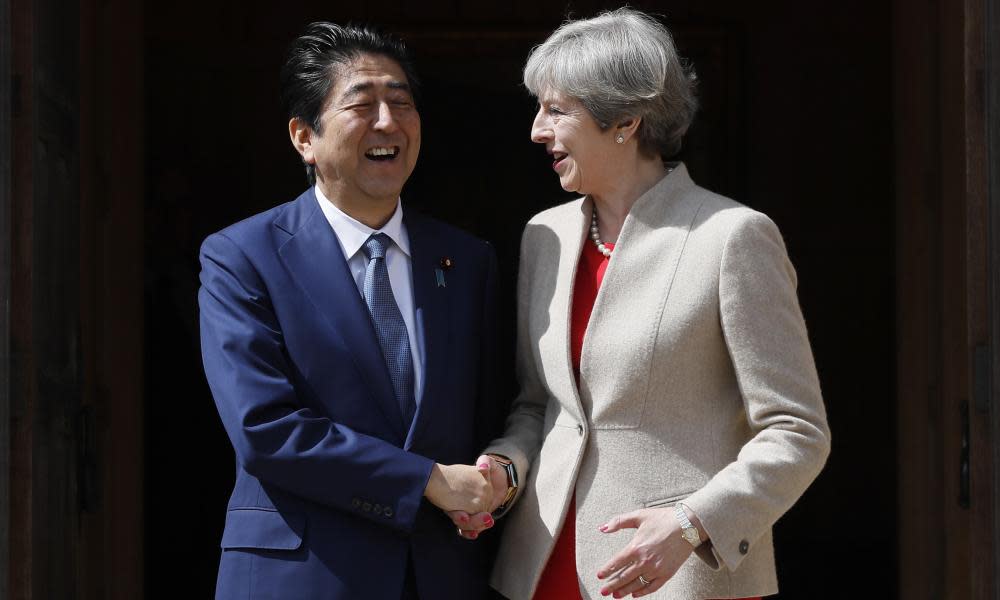Japan seeks early free trade talks with UK amid Brexit fears

Japan wants to hold early free trade talks with Britain, in a sign of growing concern among the country’s businesses over post-Brexit access to the European market.
Japan’s prime minister, Shinzo Abe, is hoping to soften the blow that Britain’s expected withdrawal from the single market could inflict on Japanese companies by starting informal talks on free trade before Britain leaves the EU, the Nikkei business newspaper said, citing unnamed sources.
Under EU rules, official negotiations cannot begin until after Britain has left the trading bloc. But Abe’s enthusiasm for an early free trade agreement will encourage Theresa May and other pro-Brexit politicians who insist that leaving the EU will mean Britain is better placed to trade freely with major economies.
The Japanese leader is concerned about the consequences of Brexit because of the widely held perception that it will negatively affect Britain’s international standing “at a time when Japan desires a stronger bond between our two island and maritime democracies”, an official in Tokyo who is familiar with Abe’s thinking told the Guardian.
The official, who asked not to be named, added that Abe was aware that the final Brexit deal “is beyond the reach of the Japanese government”.
He said: “Whether the emerging circumstances will turn out to be in favour, or otherwise, of the City of London’s interests is what London and Brussels must work out. Needless to say, Tokyo is lobbying London so that Japanese financial interests are protected.”
Brexit poses serious risks for Japanese firms if, as expected, it leaves Britain outside the single market.
Japanese financial institutions are concerned about the loss of the “EU passport”, which enables banks based in London to operate freely across Europe’s financial markets while retaining most of their staff and operations in the capital.
More than 1,000 Japanese firms operate in Britain, employing about 140,000 people, and have invested more than £40bn in the country.
Evidence that Japanese firms are preparing for a hard Brexit surfaced recently when Daiwa Securities, which has its headquarters in London, announced that it would open a subsidiary in Frankfurt.
Nomura Securities, Japan’s biggest brokerage, is reportedly planning to make Frankfurt its post-Brexit base, but it will retain a large number of staff at its current EU headquarters in the City. Other Japanese banks are expected to follow suit.
Analysts said that Abe was trying to ensure that Japan’s strong commercial ties would remain relatively unaffected, even by a hard Brexit. Tokyo is also reportedly months away from agreeing a free trade deal with the EU – where more than 600,000 jobs are linked to exports to Japan – after more than four years of negotiations.
“There are growing voices within Japanese business and industry calling on the government to ensure minimal disruption to bilateral economic ties,” said Osamu Tanaka, chief economist at the Dai-Ichi Life Research Institute in Tokyo.
Abe’s overture is based on the premise that May will set Britain on course for a hard Brexit, despite the blow to her authority from the general election result.
“I’m not expecting an exodus of Japanese banks to Germany, but they recognise that they need to have some sort of presence inside the EU after Britain leaves,” Tanaka said.
Manufacturers and other firms would adopt a “wait-and-see” approach, he added. “Even a hard Brexit might not dramatically affect trade between Britain and the EU, so companies like Nissan are not going to prepare to leave only to discover at a later date that there was no need.”
Martin Schulz, senior economist at the Fujitsu Research Institute in Tokyo, predicted that Japanese banks would have a significantly weaker presence in the City after Brexit.
“Japanese banks are particularly affected by Brexit because most major banks have their strategic global headquarters in London, which is not the case for US and EU banks,” Schulz said.
“Most western banks are planning to diversify into the European market, which brings more business to Frankfurt, Dublin and Paris. That strategy is more difficult for Japanese banks, but they will likely follow.”
Japan’s major carmakers have so far indicated they have faith in the British economy after Brexit.
Toyota announced a £240m investment in a car assembly plant in Derby, while Nissan committed to build its new Qashqai model at its plant in Sunderland, following a sweetheart deal between the business secretary, Greg Clark, and the firm’s chief executive, Carlos Ghosn.
Last August, the Japanese telecoms and internet firm SoftBank mounted a £24bn takeover of Britain’s most valuable technology company, ARM.
Other analysts were confident that Japanese banks would retain a significant presence in London.
“Of course the main drawback of Brexit for Japanese financial institutions is the issue of the single licence [EU passport], so it would be natural for them to shift to Frankfurt, Amsterdam or Dublin,” said Nomura’s chief economist for Japan, Takashi Miwa.
“But my sense is still that the UK has other advantages – like its legal system and financial knowhow – so Japanese financial institutions will retain major functions in London even after Brexit.”
Japan’s government and Keidanren, the country’s biggest business lobby, have made little secret of their concern over post-Brexit risks to the British and Japanese economies.
At last year’s G20 summit in Beijing, Tokyo issued a strongly worded letter to the EU and UK outlining fears over the future potential to export from Britain to third countries.
“The Japanese government and Keidanren are most concerned that the UK will lose its status as a free trade partner with the European continent, and that will in turn mean Japan losing certain advantages,” Miwa said.

 Yahoo News
Yahoo News 
